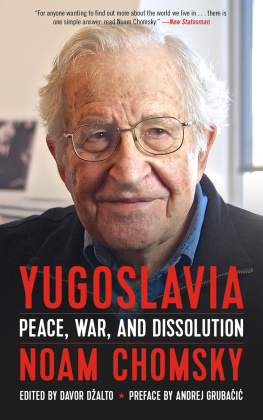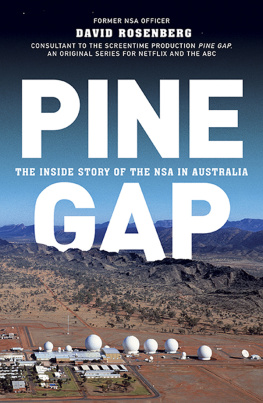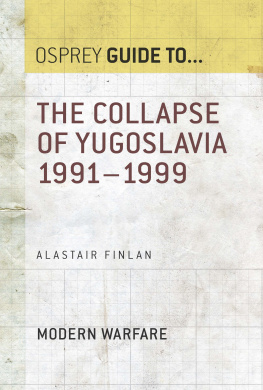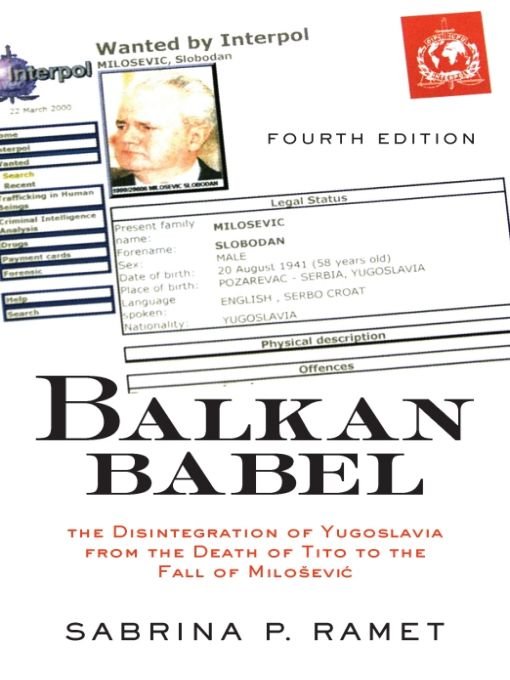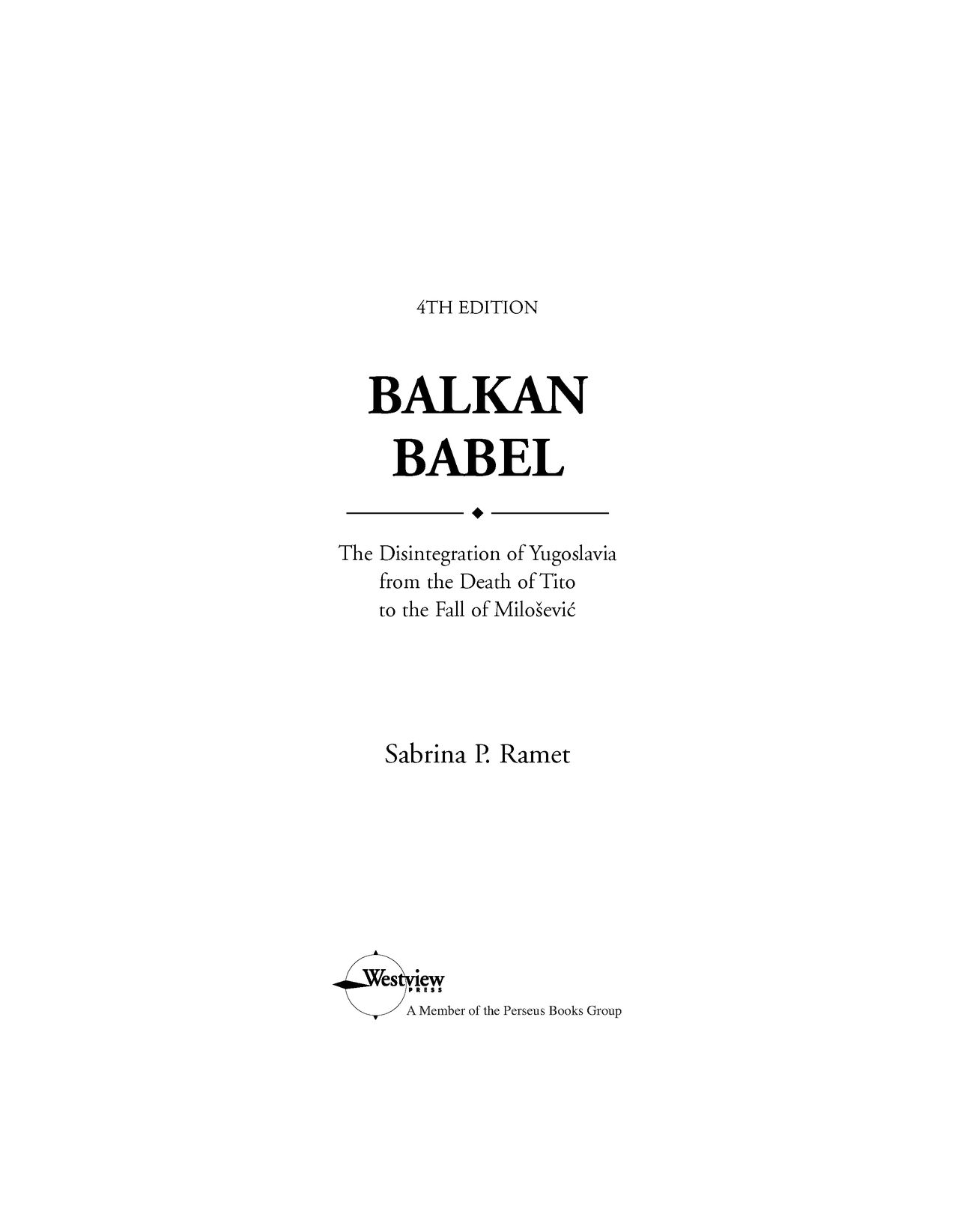Table of Contents
For Susan McEachern, my friend
List of Abbreviations
| AVNOJ | Antifaistiko Vijee e Narodnog Oslobodjenja Jugoslavije (Antifascist Council of the Peoples Liberation of Yugoslavia) |
| CC | Central Committee |
| CIA | Central Intelligence Agency |
| CPY | Communist Party of Yugoslavia |
| CSCE | Conference on Security and Cooperation in Europe |
| DOS | Democratic Opposition of Serbia |
| DSS | Democratic Party of Serbia |
| EC | European Community |
| EU | European Union |
| EFTA | European Free Trade Association |
| FBIS | Foreign Broadcast Information Service |
| FRY | Federal Republic of Yugoslavia |
| GATT | General Agreement on Tariffs and Trade |
| HDZ | Hrvatska Demokratska Zajednica (Croatian Democratic Community) |
| HVO | Hrvatsko Vijee Obrane (Croatian Defense Council) |
| ICTFY | International War Crimes Tribunal for the Former Yugoslavia |
| IFOR | Implementation Force |
| IMF | International Monetary Fund |
| IMRO-DPMNU | Internal Macedonian Revolutionary OrganizationDemocratic |
| Party of Macedonian National Unity |
| JNA | Jugoslovenska Narodna Armija (Yugoslav Peoples Army) |
| JUL | Yugoslav United Left |
| KLA | Kosova Liberation Army |
| LCY | League of Communists of Yugoslavia |
| MUP | Ministarstvo Unutranjih Poslova (Ministry of Internal Affairs) |
| NATO | North Atlantic Treaty Organization |
| NDH | Nezavisna Drava Hrvatska (Independent State of Croatia, 194145) |
| NUNS | Nezavisno Udruenje Novinara Srbije (Independent Association of Journalists of Serbia) |
| OHR | Office of the High Representative |
| OSCE | Organization for Security and Cooperation in Europe |
| PDP | Party for Democratic Prosperity |
| PMBLA | Preevo, Medvedja, and Bujanovac Liberation Army |
| PPD | Party for Democratic Prosperity |
| RFE | Radio Free Europe |
| RL | Radio Liberty |
| RS | Republika Srpska (Serbian Republic of Bosnia-Herzegovina) |
| SANU | Srpska Akademija Nauka i Umetnosti (Serbian Academy of Sciences and Art) |
| SAS | Special Air Service |
| SAWPY | Socialist Alliance of Working People of Yugoslavia |
| SDA | Stranka Demokratske Akcije (Party of Democratic Action) |
| SDB | Sluba Dravne Bezbednosti (State Security Service) |
| SDS | Srpska Demokratska Stranka (Serbian Democratic Party) |
| SFOR | Stabilization Force |
| SFRY | Socialist Federated Republic of Yugoslavia |
| SNV | Serb National Council (opposition) |
| UDBa | Uprava Dravne Bezbednosti (State Security Administration, i.e., secret police) |
| UNPROFOR | United Nations Protection Force |
| USAID | U.S. Agency for International Development |
| WCN | World News Connection |
Credits
Permission has been generously given to reprint material in this book that has been adapted from the following articles:
Pedro Ramet. An earlier version of chapter 1 was published in Crossroads, No. 23 (1987) and is reprinted here by kind permission of Joseph Zajda, editor-in-chief, Political Crossroads, successor-journal to Crossroads.
Sabrina Petra Ramet, Yugoslavias Troubled Times, Global Affairs, Vol. 5, No. 1 (Winter 1990). (This article is reprinted as chapter 2 with revisions.)
Sabrina Petra Ramet, The Role of the Press in Yugoslavia, Yugoslavia in TransitionChoices and Constraints: Essays in Honour of Fred Singleton, eds. John B. Allcock, John J. Horton, and Marko Milivojevi (Oxford: Berg Publishers, 1992), pp. 414441.
Pedro Ramet, The Catholic Church in Yugoslavia, 19451989, Catholicism and Politics in Communist Societies, ed. Pedro Ramet (Durham, N.C.: Duke University Press, 1990).
Pedro Ramet, The Serbian Orthodox Church, Eastern Christianity and Politics in the Twentieth Century, ed. Pedro Ramet (Durham, N.C.: Duke University Press, 1988).
Sabrina Petra Ramet, Islam in Yugoslavia Today, Religion in Communist Lands (published by the Keston Institute and now called Religion, State, and Society), Vol. 18, No. 3 (autumn 1990).
Sabrina Petra Ramet, The Bosnian War and the Diplomacy of Accommodation, Current History, Vol. 93, No. 586 (November 1994).
Permission was also kindly given for reprinting parts of the following items:
From The Dictionary of the Khazars, by Milorad Pavi, trans., C. Pribievi-Zori. Copyright 1988 by Alfred A. Knopf, Inc. Reprinted by permission of the publisher.
Excerpt from South to Destiny by Dobrica osi, copyright 1982 by Harcourt Brace & Company, reprinted by permission of Harcourt Brace & Company.
Excerpt from Garden, Ashes by Danilo Ki, trans. William J. Hannaker, English translation copyright 1975 by Harcourt Brace & Company, reprinted by permission of the publisher.
From Black Lamb and Grey Falcon by Rebecca West. Copyright 1941 by Rebecca West and Atlantic Monthly. Copyright renewed 1968, 1969 by Rebecca West. Used by permission of Viking Penguin, a division of Penguin Books USA Inc
Agamemnon, from The Oresteia by Aeschylus, translated by Robert Fagles, translation copyright 1966, 1967, 1975 by Robert Fagles. Used by permission of Viking Penguin, a division of Penguin Putnam Inc.
From The Republic by Plato, translated by Richard W. Sterling and William C. Scott. Copyright 1985 by Richard W. Sterling and William C. Scott. Reprinted by permission of W. W. Norton & Company, Inc.
Paraphrase from The Laws by Plato, translated by Trevor J. Saunders, (London: Penguin Books, 1970), Introduction, p. 29.
Foreword: The Politics of Cultural Diversity in Former Yugoslavia
The collapse of Soviet and East European communism has upset all the political and ideological conventions in the countries concerned. One noticeable consequence has been the revival of nationalismthat much misunderstood mutant ideology whose many faces have tested a legion of analysts. The nationalisms of Eastern Europe, in particular, have long been a stumbling block for U.S. observers. The example of a stable civil society like the United States, where an assimilationist political culture mitigated the effects of ancestry, really cannot inform the ethnic relations of East European multinational states. The latterand Yugoslavia was a prime exampleare really conglomerates of historical nations, each with its own internal subnationalor, if you prefer, ethnicproblems. Yugoslavia has not survived the pressures of its component parts and no longer exists as a state. For insight into why this has happened, it might be wise to look at the political implications of cultural diversity in what used to be Yugoslavia and its successor states. It is to Sabrina Ramets great credit that she understood the cultural context of South Slavic nationality relations at a time when most of her colleagues promoted entirely unrealistic readings of the subject.



